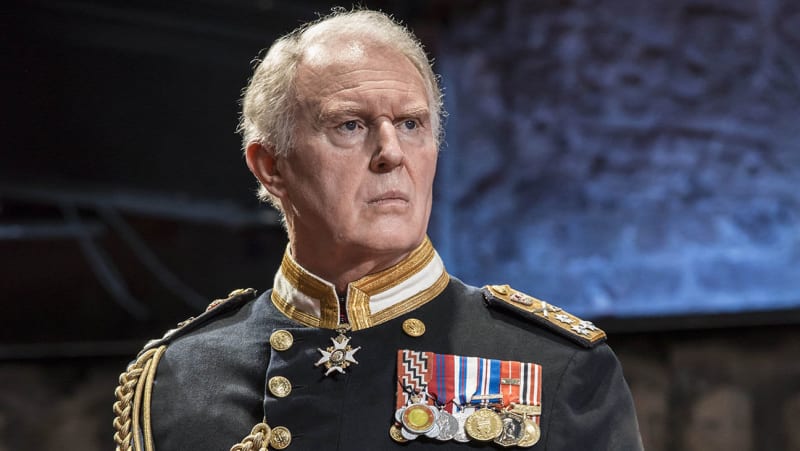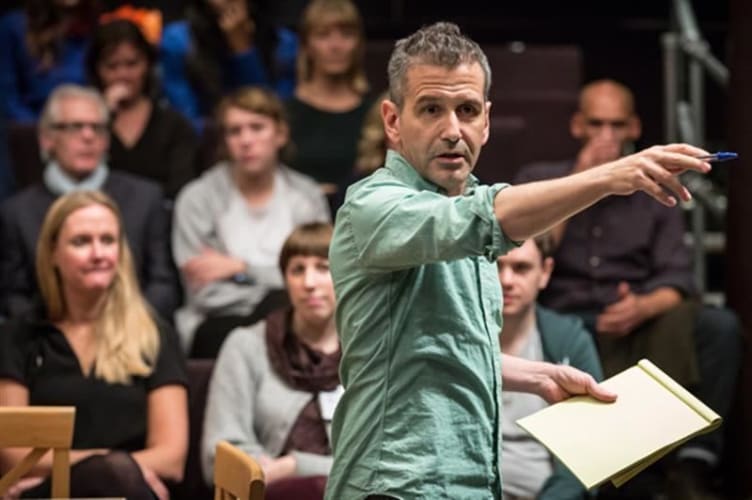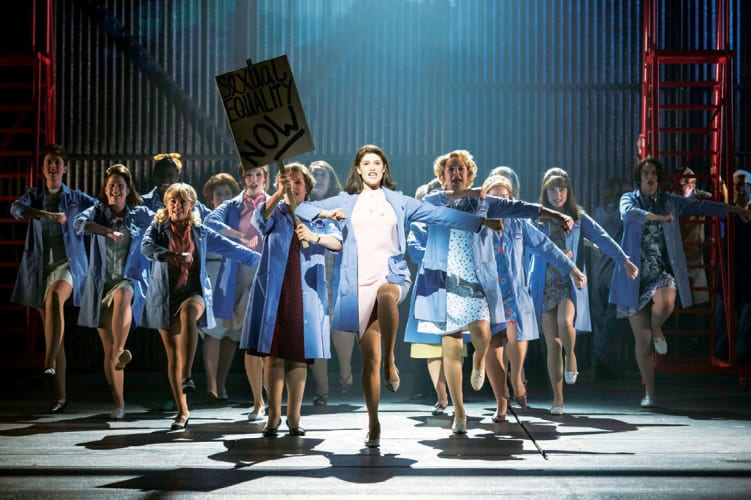Other Major Theatres
- Almeida
- Royal Court
- Donmar
- Young Vic
- St James
- Tricycle
- Hampstead
As one might expect under Rupert Goold, who has always been one of the most adventurous of theatre directors, the Almeida has peppered some of the finest moments of the year with the odd disaster.
Many would tip it for both best new play and best revival of 2014.
Goold has worked impressively with Mike Bartlett before but King Charles III is probably his best work since Enron.
A satire on British politics, monarchy and the media, what takes this play out of the ordinary is its use of cod Shakespearean language and mixing of plot themes from the Bard into a contemporary/futuristic piece.
In many ways, Our Town could not be more different from King Charles III. Thornton Wilder’s seemingly sleepy tale of small town American life at the beginning of the last century was brought to glorious life by David Cromer in a production that both involved and educated its audience as it delighted them.
Currently playing is The Merchant of Venice, also directed by Goold in a racy version set in Las Vegas today. The first half is invigorating and witty but the conceit fails as we reach the court scene. In any event, this co-production with the RSC first seen in Stratford three years ago nicely showcases the talents of Ian McDiarmid playing Shylock and Susannah Fielding as an airhead Portia.
Under Vicky Featherstone, the Royal Court has also had a few too many misses in amongst the hits. Even so, at its best the theatre remains a source of challenging new writing that often allowed good size casts to appear on a London stage, which is becoming all too rare.
By way of contrast, there were also a number of solo performances including Nick Payne’s personally delivered The Art of Dying.
Contemporary issues came under the microscope in Tim Price’s Teh Internet Is Serious Business, which looked at the ways in which we communicate, veering sometimes excessively into the world of computer gaming but making some valid observations about life today.
The Nether by Jennifer Haley is heading for the West End in 2015. It combines issues of identity, communications, technology and human nature, often with chilling results.
Politics today came into view in Hope by Jack Thorne. This was 1980s-style agitprop at its very best as the leaders of a local council were forced to face the difficulties imposed by government cuts.
Welsh playwright Abi Morgan created The Mistress Contract to look into modern relationships from an American, generally feminist perspective.
The Wolf from the Door by Rory Mullarkey won the George Devine Award but seemed little more than a rollicking road movie played out on stage.
The year opened with another solo The Beckett Trilogy, which enabled Lisa Dwan to demonstrate her unforgettable virtuosity in pieces that must be almost unplayable.
Upstairs, Molly Davies’s God Bless the Child took a wry and often cynical look at life in and beyond the junior school room, once again commenting unkindly on the media and personality frenzy that is taking over all of our lives.
Josie Rourke continues to please at the Donmar, consistently making an effort to inject variety into the programme.
This reviewer’s favourite production was Privacy by James Graham, a partly verbatim work that is a witty but at times terrifying look at the ways in which we open ourselves up to ridicule or even blackmail.
The heady and entirely contemporary combination of reality theatre, fiction and metatheatre directed by Miss Rourke really deserved a West End transfer.
Her production of Conor MacPherson’s The Weir got exactly that, as it had first time around. A well-chosen cast ensured that the revival of this simple piece of Irish storytelling was special.
Judging by some very favourable reviews, the musical City of Angels might also head into a larger theatre at the end of its current run. With old-fashioned values and the kind of story of a 1940s private eye and his conquests that does not require great concentration but still pleases, it is just what audiences might enjoy during the cold winter months.
Following the success of her all-female Julius Caesar, Phyllida Lloyd returned to the Donmar with Henry IV. Once again, Harriet Walter led a cast of women who attempted to compress the seven-hour epic which appeared the following month at the Barbican into a mere two.
Set in a prison, this production may be more of an entertainment paying homage to Shakespeare than a faithful representation but it was fun.
Peter Gill’s Versailles commemorated the centenary of the start of the Great War with a big, important piece looking at its aftermath through the eyes of one, extended English family. Both moving and thought-provoking, this showed the playwright at his very best.
Fathers and Sons based by Brian Friel on Turgenev’s novel was memorable for strong performances by Seth Numrich and Elaine Cassidy under the direction of Lyndsey Turner in a Chekhovian play about 19th-century Russian life in transition.
Under David Lan, the Young Vic goes from strength to strength. Its formula mixes big names with the generation seeking to establish itself.
The names don’t come much bigger than Gillian Anderson, who was cast alongside Ben Foster and Vanessa Kirby in A Streetcar Named Desire. Benedict Andrews’s staging of the Tennessee Williams classic was ultra-stylish but suffered from a slow revolve that habitually left visitors struggling to either see or hear. Even so, the performances made up for a great deal.
Another iconic American playwright, Arthur Miller, received an unusual treatment from Belgian auteur Ivan van Hove. Rather than playing A View from the Bridge straight, the director went for high concept. This appealed to many but also alienated some viewers who found the play overwhelmed by the staging.
Juliet Stevenson gave a tour-de-force as cheerful Winnie in Beckett’s Happy Days, which proved so successful that it is returning in 2015.
A visit from Peter Brook is always a special occasion and The Valley of Astonishment lived up to expectations, exploring a series of unusual mental afflictions with warmth and intelligence.
Younger companies also made significant contributions, none more so than 1927 with their quasi-graphic novel on stage, Golem. This might have been inspired by the German novel from almost a century ago but became a unique theatrical experience for everybody lucky enough to attend. Actors and cartoons interacted perfectly, while the story of a squad of junior Frankensteins beginning to threaten society contained enough wit and foresight to fill 90 breathtaking minutes.
As her prize for winning the James Menzies-Kitchin award, Kate Hewitt was given the opportunity to bring her vision for Caryl Churchill’s Far Away to the Clare Studio. She was lucky enough to have the playwright present on an opening night that showed real imagination and promise.
Also on a smaller stage, in the Maria Studio, Matthew Xia, winner of the Genesis Future Directors Award, created a lively and affectionate new version of the South African anti-apartheid classic Sizwe Banzi is Dead, capitalising on the script by Athol Fugard, John Kani and Winston Ntshona.
The St James Theatre continues to grow in stature, although some of its selections left much to be desired. The undoubted highlight during 2014 was the belated British première by Jamie Lloyd of Greg Kotis’s comic musical Urinetown.
An energetic cast thrilled theatre goers with a darkly funny musical about lavatories that owes something to the Rocky Horror Show and Little Shop of Horrors. A West End transfer followed.
Hot young playwright Anya Reiss brought Uncle Vanya into the 21st-century in a potentially controversial version that maintained the spirit of the original.
Under Edward Hall, Hampstead has become a theatre that is worth keeping an eye on. In particular, they now seem intent on creating opportunities for West End transfers, Di and Viv and Rose being set up for a January opening.
This year, Sunny Afternoon, a biographical musical about The Kinks created by Joe Penhall, proved popular, as much for the band’s unforgettable songs as the script. With strong direction from Hall and a good period feel aided by simple design and choreography, there is every chance that the show could be the latest jukebox musical hit to have a long West End run.
In a completely different key, Wonderland by Beth Steel presented a grim historical drama centred on the miners’ strike of 1984. Thanks to designer Ashley Martin-Davis by the end of the evening viewers would leave the theatre feeling as if they had actually been down a mine.
While there, they got a feel for the awful working conditions but also the political in-fighting that eventually killed the industry.
Then there were the Americans. Seminar by Theresa Rebeck, imported from Broadway gave Roger Allum the opportunity to shine as a failed author turned lecturer dealing with a far from easy bunch of students.
Rapture, Blister, Burn by Gina Gionfriddo presented a feminist approach to life with much of the power suggested by its title but managed to wear its learning lightly.
Good People by David Lindsay-Abaire also flew over from the States and proved popular, primarily because of a wonderful central performance from Imelda Staunton as a nobody who wants to be a somebody.
In a year with a good selection of epics, In the Vale of Health arguably took the biscuit, if only because Simon Gray’s series featured four plays in a day, something that even the RSC could not beat.
A Human Being Died That Night by Nicholas Wright based on the book by Pumla Gobodo-Madikizela made the most of the downstairs space in a truly terrifying portrait of a South African policeman turned torturer, depicted with extraordinary realism as an ordinary guy by Matthew Marsh.
The Tricycle seems to have felt the need to indulge in a number of co-productions, often seen elsewhere prior to reaching Kilburn. Indhu Rubasingham did however ensure that the theatre continued to celebrate the cultural diversity of its community.
The theatre did feature a number of valuable presentations, generally of plays from outside the United Kingdom.
The one British piece that really hit the nail on the head was from performance artist/playwright Kate Tempest who has been building a big reputation across the country.
Hopelessly Devoted was a generous, warm-hearted piece about the experience of going to prison and more particularly, trying to get back into normal life after release.
The theatre also managed a bit of a coup with the world première of The Colby Sisters of Pittsburgh, Pennsylvania by American playwright Adam Bock.
Looking like a cross between a fashion show and a bitching contest, it gave a British audience the chance to see how ultra-wealthy Americans live today.
Another success from across the pond was Lynn Nottage’s Intimate Apparel. This depicted the harshness of African-American life over a century ago through the eyes of a seamstress played with brilliant conviction by Tanya Moodie.
A Handful of Stars, which is part of Billy Roche’s Wexford Trilogy, filled a gap by appealing to the Irish community who have long lived in this part of north-west London. This transfer from Theatre 503, whose artistic director Paul Robinson was at the helm, caught the period perfectly and proved a nice complement to Josie Rourke’s revival of The Weir.


